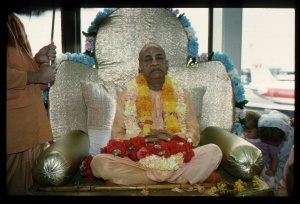SB 9.21.19-20: Difference between revisions
m (1 revision(s)) |
(Vanibot #0054 edit - transform synonyms into clickable links, which search similar occurrences) |
||
| (One intermediate revision by one other user not shown) | |||
| Line 1: | Line 1: | ||
{{info | {{info | ||
|speaker= | |speaker=Śukadeva Gosvāmī | ||
|listener=King | |listener=King Parīkṣit | ||
}} | }} | ||
[[Category:Srimad-Bhagavatam - Canto 09 Chapter 21]] | |||
[[Category:Bhagavatam Verses Spoken by Sukadeva Gosvami - Vanisource|092119]] | |||
<div style="float:left">'''[[Srimad-Bhagavatam]] - [[SB 9|Ninth Canto]] - [[SB 9|Ninth Canto]] - [[SB 9.21: The Dynasty of Bharata|Chapter 21: The Dynasty of Bharata]]'''</div> | |||
<div style="float:right">[[File:Go-previous.png|link=SB 9.21.18]] '''[[SB 9.21.18]] - [[SB 9.21.21]]''' [[File:Go-next.png|link=SB 9.21.21]]</div> | |||
{{RandomImage}} | |||
==== TEXTS 19-20 ==== | ==== TEXTS 19-20 ==== | ||
<div | <div class="verse"> | ||
gargāc chinis tato gārgyaḥ | :gargāc chinis tato gārgyaḥ | ||
kṣatrād brahma hy avartata | :kṣatrād brahma hy avartata | ||
duritakṣayo mahāvīryāt | :duritakṣayo mahāvīryāt | ||
tasya trayyāruṇiḥ kaviḥ | :tasya trayyāruṇiḥ kaviḥ | ||
puṣkarāruṇir ity atra | |||
ye brāhmaṇa-gatiṁ gatāḥ | :puṣkarāruṇir ity atra | ||
bṛhatkṣatrasya putro 'bhūd | :ye brāhmaṇa-gatiṁ gatāḥ | ||
dhastī yad-dhastināpuram | :bṛhatkṣatrasya putro 'bhūd | ||
:dhastī yad-dhastināpuram | |||
</div> | </div> | ||
| Line 21: | Line 27: | ||
==== SYNONYMS ==== | ==== SYNONYMS ==== | ||
<div | <div class="synonyms"> | ||
''[//vanipedia.org/wiki/Special:VaniSearch?s=gargāt&tab=syno_o&ds=1 gargāt]'' — from Garga (another grandson of Bharadvāja); ''[//vanipedia.org/wiki/Special:VaniSearch?s=śiniḥ&tab=syno_o&ds=1 śiniḥ]'' — a son named Śini; ''[//vanipedia.org/wiki/Special:VaniSearch?s=tataḥ&tab=syno_o&ds=1 tataḥ]'' — from him (Śini); ''[//vanipedia.org/wiki/Special:VaniSearch?s=gārgyaḥ&tab=syno_o&ds=1 gārgyaḥ]'' — a son named Gārgya; ''[//vanipedia.org/wiki/Special:VaniSearch?s=kṣatrāt&tab=syno_o&ds=1 kṣatrāt]'' — although he was a ''kṣatriya''; ''[//vanipedia.org/wiki/Special:VaniSearch?s=brahma&tab=syno_o&ds=1 brahma]'' — the ''brāhmaṇas''; ''[//vanipedia.org/wiki/Special:VaniSearch?s=hi&tab=syno_o&ds=1 hi]'' — in deed; ''[//vanipedia.org/wiki/Special:VaniSearch?s=avartata&tab=syno_o&ds=1 avartata]'' — became possible; ''[//vanipedia.org/wiki/Special:VaniSearch?s=duritakṣayaḥ&tab=syno_o&ds=1 duritakṣayaḥ]'' — a son named Duritakṣaya; ''[//vanipedia.org/wiki/Special:VaniSearch?s=mahāvīryāt&tab=syno_o&ds=1 mahāvīryāt]'' — from Mahāvīrya (another grandson of Bharadvāja); ''[//vanipedia.org/wiki/Special:VaniSearch?s=tasya&tab=syno_o&ds=1 tasya]'' — his; ''[//vanipedia.org/wiki/Special:VaniSearch?s=trayyāruṇiḥ&tab=syno_o&ds=1 trayyāruṇiḥ]'' — the son named Trayyāruṇi; ''[//vanipedia.org/wiki/Special:VaniSearch?s=kaviḥ&tab=syno_o&ds=1 kaviḥ]'' — a son named Kavi; ''[//vanipedia.org/wiki/Special:VaniSearch?s=puṣkarāruṇiḥ&tab=syno_o&ds=1 puṣkarāruṇiḥ]'' — a son named Puṣkarāruṇi; ''[//vanipedia.org/wiki/Special:VaniSearch?s=iti&tab=syno_o&ds=1 iti]'' — thus; ''[//vanipedia.org/wiki/Special:VaniSearch?s=atra&tab=syno_o&ds=1 atra]'' — therein; ''[//vanipedia.org/wiki/Special:VaniSearch?s=ye&tab=syno_o&ds=1 ye]'' — all of them; ''[//vanipedia.org/wiki/Special:VaniSearch?s=brāhmaṇa&tab=syno_o&ds=1 brāhmaṇa]-[//vanipedia.org/wiki/Special:VaniSearch?s=gatim&tab=syno_o&ds=1 gatim]'' — the position of ''brāhmaṇas''; ''[//vanipedia.org/wiki/Special:VaniSearch?s=gatāḥ&tab=syno_o&ds=1 gatāḥ]'' — achieved; ''[//vanipedia.org/wiki/Special:VaniSearch?s=bṛhatkṣatrasya&tab=syno_o&ds=1 bṛhatkṣatrasya]'' — of the grandson of Bharadvāja named Bṛhatkṣatra; ''[//vanipedia.org/wiki/Special:VaniSearch?s=putraḥ&tab=syno_o&ds=1 putraḥ]'' — the son; ''[//vanipedia.org/wiki/Special:VaniSearch?s=abhūt&tab=syno_o&ds=1 abhūt]'' — became; ''[//vanipedia.org/wiki/Special:VaniSearch?s=hastī&tab=syno_o&ds=1 hastī]'' — Hastī; ''[//vanipedia.org/wiki/Special:VaniSearch?s=yat&tab=syno_o&ds=1 yat]'' — from whom; ''[//vanipedia.org/wiki/Special:VaniSearch?s=hastināpuram&tab=syno_o&ds=1 hastināpuram]'' — the city of Hastināpura (New Delhi) was established. | |||
</div> | </div> | ||
| Line 28: | Line 34: | ||
==== TRANSLATION ==== | ==== TRANSLATION ==== | ||
<div | <div class="translation"> | ||
From Garga came a son named Śini, and his son was Gārgya. Although Gārgya was a kṣatriya, there came from him a generation of brahmaṇas. From Mahāvīrya came a son named Duritakṣaya, whose sons were Trayyāruṇi, Kavi and Puṣkarāruṇi. Although these sons of Duritakṣaya took birth in a dynasty of kṣatriyas, they too attained the position of brāhmaṇas. Bṛhatkṣatra had a son named Hastī, who established the city of Hastināpura [now New Delhi]. | From Garga came a son named Śini, and his son was Gārgya. Although Gārgya was a kṣatriya, there came from him a generation of brahmaṇas. From Mahāvīrya came a son named Duritakṣaya, whose sons were Trayyāruṇi, Kavi and Puṣkarāruṇi. Although these sons of Duritakṣaya took birth in a dynasty of kṣatriyas, they too attained the position of brāhmaṇas. Bṛhatkṣatra had a son named Hastī, who established the city of Hastināpura [now New Delhi]. | ||
</div> | </div> | ||
__NOTOC__ | |||
<div style="float:right; clear:both;">[[File:Go-previous.png|link=SB 9.21.18]] '''[[SB 9.21.18]] - [[SB 9.21.21]]''' [[File:Go-next.png|link=SB 9.21.21]]</div> | |||
__NOTOC__ | |||
__NOEDITSECTION__ | |||
Latest revision as of 23:52, 18 February 2024

A.C. Bhaktivedanta Swami Prabhupada
TEXTS 19-20
- gargāc chinis tato gārgyaḥ
- kṣatrād brahma hy avartata
- duritakṣayo mahāvīryāt
- tasya trayyāruṇiḥ kaviḥ
- puṣkarāruṇir ity atra
- ye brāhmaṇa-gatiṁ gatāḥ
- bṛhatkṣatrasya putro 'bhūd
- dhastī yad-dhastināpuram
SYNONYMS
gargāt — from Garga (another grandson of Bharadvāja); śiniḥ — a son named Śini; tataḥ — from him (Śini); gārgyaḥ — a son named Gārgya; kṣatrāt — although he was a kṣatriya; brahma — the brāhmaṇas; hi — in deed; avartata — became possible; duritakṣayaḥ — a son named Duritakṣaya; mahāvīryāt — from Mahāvīrya (another grandson of Bharadvāja); tasya — his; trayyāruṇiḥ — the son named Trayyāruṇi; kaviḥ — a son named Kavi; puṣkarāruṇiḥ — a son named Puṣkarāruṇi; iti — thus; atra — therein; ye — all of them; brāhmaṇa-gatim — the position of brāhmaṇas; gatāḥ — achieved; bṛhatkṣatrasya — of the grandson of Bharadvāja named Bṛhatkṣatra; putraḥ — the son; abhūt — became; hastī — Hastī; yat — from whom; hastināpuram — the city of Hastināpura (New Delhi) was established.
TRANSLATION
From Garga came a son named Śini, and his son was Gārgya. Although Gārgya was a kṣatriya, there came from him a generation of brahmaṇas. From Mahāvīrya came a son named Duritakṣaya, whose sons were Trayyāruṇi, Kavi and Puṣkarāruṇi. Although these sons of Duritakṣaya took birth in a dynasty of kṣatriyas, they too attained the position of brāhmaṇas. Bṛhatkṣatra had a son named Hastī, who established the city of Hastināpura [now New Delhi].